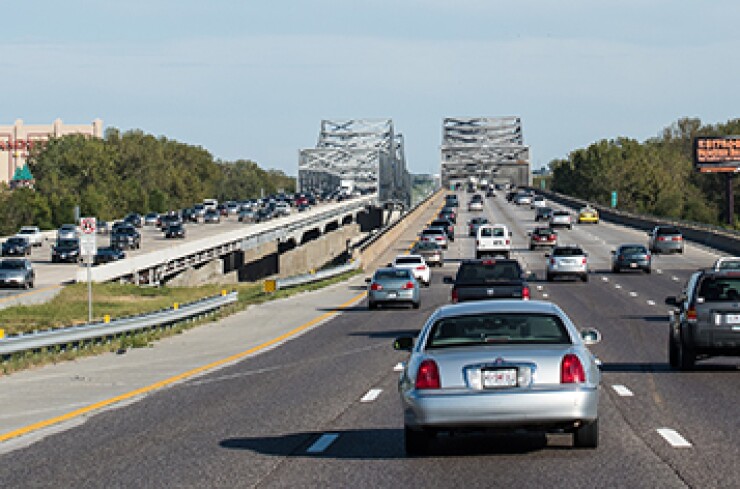
DALLAS -- An unexpected increase in state gasoline tax collections prompted by low fuel prices and the assurance of five years of higher federal road funding will allow Missouri to maintain its highways at current conditions over the next five years without a major revenue boost, according to a state report.
More motorists are driving further and putting more gasoline into their tanks as fuel prices have fallen, raising state gasoline tax revenues in fiscal 2015 to $47 million above expectations, said Patrick McKenna, director of the Missouri Department of Transportation, which issued the report.
In addition, he said, the new Fixing America's Surface Transportation Act will provide an average of $1 billion per year of federal funding to Missouri through 2020, up from $937 million in fiscal 2015.
MoDOT will be able to come up with the required $250 million per year of required state matching funds only by drawing down its cash reserves and some creative accounting, McKenna said.
The department's cash reserves are expected to dwindle from the current $800 million to $200 million by fiscal 2021, which will begin July 1, 2020, MoDOT said.
The state hopes to save $40 million per year in maintenance costs by using federal highway safety grants as the match for federal highway funding, which it will devote to road upkeep, McKenna said.
"Having to take extraordinary measures to do this is not really the position we ought to be in," he said. "We ought to be able to do that as a matter of course."
The Missouri Highways and Transportation Commission last week canceled a five-year moratorium on new roads that was adopted after voters rejected a transportation-dedicated sales tax in November 2014.
The highway commission also reversed its decision from February 2015 to focus the limited transportation resources on keeping 8,000 miles of primary roads in good condition with only limited maintenance on the other 26,000 miles in the system. MoDOT said then that it needed an additional $160 million per year as the state match to obtain its full share of federal funding.
New state road projects will be limited until a robust, sustainable revenue source is in place, McKenna said.
"We're trying to focus on taking care of the system," he said.
Tolling Interstate 70 is one of the funding options that should be considered, McKenna said.
Missouri has one of the three slots available in a federal pilot program that would allow states to levy tolls on existing interstate lanes. The state has until December to decide whether to go ahead with its application to toll I-70 between St. Louis and Kansas City or lose the slot.
Missouri can no longer adequately maintain its existing road system with revenues from a fuel tax that has not been increased since 1996, said Stephen Miller, chairman of the Missouri Highways and Transportation Commission.
"For some, paying a tax, even a user-based fee like the fuel tax, is no longer seen as a patriotic investment in the common good but something that must be avoided at all cost," he said. "Unless our current leaders act to provide a dependable, recurring and long-term funding source we are in danger of squandering our inheritance."
Bills to raise the 17.3 cent per gallon tax on gasoline by 1.5 cents and the diesel tax by 3.5 cents, as well as a proposal to add another 7 cents to the fuels tax levy, were filed last week in the General Assembly. Raising the tax by 7 cents per gallon would require voter approval.





